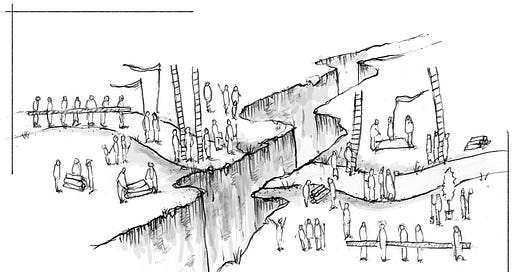“It is in the powder of shattered communities that anti-politics swirls, raising towering dust-devils of demagoguery and extremism. These tornadoes threaten to tear down whatever social structures still stand.” - George Monbiot (The Guardian, 2017).
No doubt this post-election moment is a challenging one for many of you. Uncertainty abounds. Democracy seems fragile.
For others, it may be a time of celebration, but nonetheless underpinned by a deep distrust in our institutions.
Regardless, we all share a path forward.
There is not much further upstream of our social and political ailments than the collapse of place-based community life.
Adrift and disconnected, we look elsewhere to find belonging and connection. We have become susceptible to tribalized political identities and easy narratives demonizing others. Or we retreat into the syrupy glow of on-line life and our social-media bubbles.
Building the muscle memory for a tolerant, inclusive, participatory democracy starts from the ground up. And this begins in our place-based communities.
It arises in everyday life, with all the different people you bump into during your daily routines. It’s in your eye contact and your body.
It happens when we gather together with others to steward the patch of earth where we reside. It’s through sharing perspectives and collaborating on a common future.
And it’s rooted in the deep self-confidence that comes from belonging somewhere, intimately connected with its people and the place.
Participatory civic life isn’t just the foundation for politics. It is politics.
It provides a sense of agency, restores social trust, and exposes us the breadth of the humankind. Such efforts appeal to everyone regardless of political affiliation.
There are infinite entry points for the re-establishment of place-based community life. You don’t need to start a movement or a non-profit.
It can start with pulling out your ear-buds and chatting with your neighbor on your walk. Or by organizing an annual block party or joining an existing local club or association.
These may seem like inconsequential things, but every bit of connection is another stitch in our frayed social fabric. And the best place to start is in our neighborhoods -- the scale for which we are evolutionarily wired to build meaningful relationships and stay involved. The neighborhood is the unit of change.
We can also invest in new models, like Participatory City, that force-multiply these small connecting events into an vibrant ecosystem of participation.
Or perhaps you are someone in a position of power who convenes community-involved decision-making? Let’s leverage these processes as an opportunity to connect people together and cultivate shared identities. Community engagement can be so much more than just soliciting input to inform design, planning, or policy.
In his pre-election New York Times piece, “The Election is Happening Too Soon,” David Brooks pulls from America’s historical record to distill a clear formula. Politicians are simply, “surfers who ride the waves created by people further down in the core society … The pattern is cultural change first, then civic revival, then political reform.”
Let’s get started with cultural change and civic revival. The answer is community.






Thanks, Eric. I appreciate your work and agree that local, in-the-flesh connections are what we need most in this time. Thanks for all you do to support those connections.
So true indeed